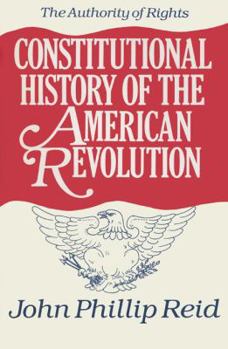Constitutional History of the American Revolution, Volume I: The Authority of Rights
(Book #1 in the Constitutional History of the American Revolution Series)
Select Format
Select Condition 
Book Overview
Constitutional History of the American Revolution
Format:Hardcover
Language:English
ISBN:0299108708
ISBN13:9780299108700
Release Date:January 1987
Publisher:University of Wisconsin Press
Length:384 Pages
Weight:1.15 lbs.
Dimensions:1.0" x 6.3" x 9.3"
Customer Reviews
2 ratings
It was not the economy, stupid, it was the ancient constitution!
Published by Thriftbooks.com User , 16 years ago
It is difficult nowadays to get an objective opinion on the USA, neither flattering nor biased against it. If I were to recommend a way to try and achieve this, I would suggest reading several good books on the matter, including this work among them. I wanted to understand the US Revolution. On the one hand, most of the US Founding Fathers seemed to have been an amazingly brilliant generation - politically speaking. On the other hand, the blunders and mistakes committed by the British government in the years before the American independence war seemed unfairly magnified. Exaggerating a little bit what I had understood from common explanations in history books, I had the misperception (or was on the verge of thinking) that touchy ungrateful colonials started a heinous war for a trifle, miserly struggling with heroic stubbornness just in order not to pay very moderate taxes on stamped paper and tea! I felt puzzled, among other reasons because other people had suffered abuses far greater than those invoked by the 13 colonies and did not rebel. Besides, I have recently read that Alexander Hamilton, a few years after the independence war, praised (somehow extravagantly) the British Constitution as the best in the world. Then, why to fight against such a well governed mother country? Reid's "Constitutional History of the American Revolution" provides an abridged and easy to understand explanation of what went wrong. "It was not the economy, stupid, it was the ancient constitution!", as traditionally understood by the American, but which was in the process of being changed by the British people. If you like, a shift of constitutional paradigm was at stake, the American colonies in favor of the constitution of the days of yore, based on the rule of law, and the British government, somehow unconsciously, moving towards one based on parliamentary supremacy ...which the American were afraid would lead to unchecked government treading on their liberties earned as property by their parents' blood and sacrifices to colonize the New World. And war eventually became the only way out to that battle of principles, in which both sides were unable to find a political solution to constitutional riddles without losing face before the other party. Probably the above is only my simplified interpretation, without enough knowledge to appreciate Reid's nuances, but in any event I enjoyed this insightful little book a lot. I could not put it down it and read it in less than a week's time (content: 5 starts; pleasure: between 3 and 4). So I highly recommend it. Other books on the USA I would also recommend are the following: A) Dealing with constitutional and political ideas: 1) "America's Constitution: A Biography" by Akhil Reed Amar; 2) "Liberty's Blueprint: How Madison and Hamilton Wrote The Federalist, Defined the Constitution, and Made Democracy Safe for the World" by Michael Meyerson; and 3) "Lincoln's Constitution" by Daniel A. Farber. B) Other b
The heart of the "constitutional debate."
Published by Thriftbooks.com User , 23 years ago
The condensing of Reid's work from the four volume set allows a student to see the major point of the constitutional debate between the colonists and thier British rulers in the late colonial period; the conception of a constitution of Parliamentary Command/Sovereign Authority (Britain) versus a constitution of Customary Rights (American Whigs). It also deftly explains the concept of "constitutional avoidance" as a basis and strategy of resistance. Some of the depth in Reid's development of the five "authority" bases may be lost in the abridged edition, but that hardly detracts from the value of this edition for the student of the American Revolution.






